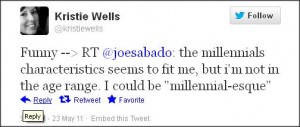“Millennials are tech savvy” was a statement mentioned in a training session about working in a multi-generational workplace I attended. “Prove it to me” attitude was attributed to Gen Xers (1965-1980). I equate these statements to the model minority myths associated with Asian Americans. They are general statements applied to groups that may or may not be true. One limitation of assigning traits to groups using one variable (generation) in my opinion is that it is too simplistic.There are also implications to these statements in that by accepting these generalities and neglecting to see the uniqueness of the individuals we deal with, we may just be making inappropriate assumptions. The other limitation of just using generations to assign attributes is that it pigeon holes individuals into categories that may not be accurate or limiting. I took this “How Millennial Are You” quiz and I appear to have many of the characteristics attributed to Millennials. I’ve joked in the past that I am “millennialesque”.

I remain open to the idea that given the experience and events that shaped the different generations, there are general differences/similarities I need to be cognizant. For example, while I do not believe that all Millennials are tech savvy, they are exposed to technologies that were not available in previous generations. These technologies then influence how the generation conduct their lives, per Marshall McLuhan’s quote – “We shape our tools and thereafter our tools shape us”.
Going back to my point of the uniqueness of individuals, should I attribute my “prove it to me” attitude to the fact that I am a member of Gen X or is my cynicism borne out of my negative experiences growing up as an immigrant in the United States and/or my experience in the workplace? Is it part of my Filipino culture? Is it just my personality? I took a DISC personality test recently in which I scored high Dominance/Influence. Apparently, some of my attributes include: demanding, strong-willed, determined and ambitious. I also like to challenge status quo.
Fact of the matter is that human beings are multidimensional shaped by our own unique experiences and backgrounds. In my case, my world view was/is shaped by many things including my immigration experience (I came here as 11 years old in 1984), my religion, my socio-economic status, educational experience, gender, and the values my parents instilled in me.
As student affairs professionals, we deal with many student populations and while we may assign students into categories (first generations, international students, …), it is important that we go beyond the generalities and respect the uniqueness of each student, shaped by their own backgrounds and experiences.
